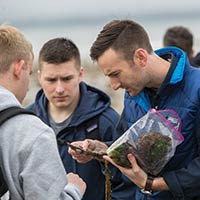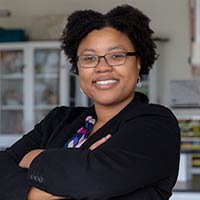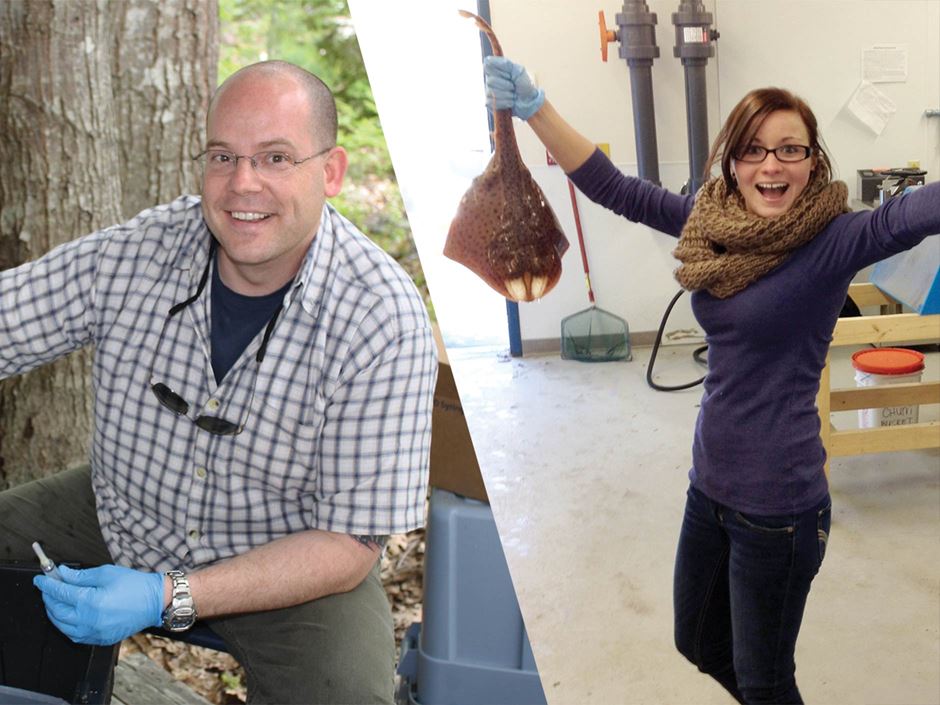Dr. Bram Lutton, Associate Professor of Biology & Biotechnology
Research area: How physiological systems such as reproduction and immunity are connected and have evolved over hundreds of millions of years.
Dr. Lutton recently published a full-length, peer-reviewed research article that includes Endicott students as co-authors. In 2018, the culmination of five years of work, Lutton published a paper via the Association for Psychological Science with senior thesis students, Alex Dimond and Brittany Ruth, and collaborators, including Professor of Psychology and renowned researcher, John Kelley.
Beyond brainpower, students contribute to a collaborative process that strengthens the research behind the study. “If you have a lot of fantastic students in need of experiential training, then it becomes possible to accomplish a great deal. Faculty can train ‘rising scientists’ to become members of a cohesive team, practicing successful communication and developing their skillset to excel at the diverse requirements of the scientific and medical industries,” says Lutton.
Dr. Gordon Ober, Assistant Professor of Environmental Science
Research area: Measuring physiological responses of seaweed and marine invertebrates to changes in temperature and pH, exploring the role of local adaptation in response to climate change, and monitoring long-term changes within marine communities.
 Dr. Gordon Ober and Hayden Wheeler
Dr. Gordon Ober and Hayden Wheeler
are building a Marine Ecology and
Climate Change Lab.
This past summer Dr. Ober started the process of building a Marine Ecology and Climate Change Lab with the help of Hayden Wheeler, an undergraduate research assistant.
“Part of being at Endicott is that you actually get to know your professor,” says Wheeler, a junior who spent the summer photographing, measuring, and weighing species, and collecting and analyzing data. “I think, especially for STEM and all the sciences, it’s important to understand the types of research that come out of the fields. It will help you understand everything as you move through your career.”
The lab space, located in the Ginger Judge Science Center, will include a recirculating seawater system, the ability to manipulate the environment (i.e. temperature), and will allow for the culture and maintenance of marine organisms.
Dr. Adilia James, Assistant Professor of Sociology
Research area: Social inequalities in work, occupations, and education; gender and sexuality theories; and race and ethnic studies
 Dr. Adilia James' research also
Dr. Adilia James' research also
was a great learning experience
for her students.
At times, faculty research can overlap with coursework in surprising ways; Dr. James used her recent work examining the underrepresentation of racial minority groups in veterinary medicine to help students understand several research methodologies.
“My students were struggling with how to interview people, how to do observational data, and how to analyze that data once they get it,” James explains. “What I ended up doing was taking anonymized versions of (my) interview transcripts and getting them to my honors students. They learned how to analyze interview data, how to write interview data, and connect the data back to the literature. My students really liked that exercise.”
Dr. James currently teaches “Introduction to Sociology,” “Social Problems,” “Race and Ethnicity in U.S. Society,” and “Research Methods.”
Dr. Anna R. McAlister, Associate Professor of Marketing
Research area: Interdisciplinary research on consumer behavior in the areas of food and beverage marketing
 Dr. Anna McAlister and Shannon Harris
Dr. Anna McAlister and Shannon Harris
researched kids' menus and how they
impact food choices.
In 2018, Dr. McAlister partnered with senior Shannon Harris on a study of kids’ menus and how the menu format impacts food choices. At the 2019 American Academy of Advertising conference, Harris had the opportunity to present the full findings in “Kids’ Restaurant Menus: Formatting Can Significantly Impact Food Choice” during a session about research collaborations between undergraduate students and faculty.
McAlister notes that working with students allows for a fresh perspective on research. “The professor should already be an expert in his or her field,” she says. “Although this means the professor brings a wealth of knowledge to the project, it may also mean they are a little narrow in their thinking since there is typically an established way of thinking about a particular topic. Even if they have done some preliminary reading in the area, the student is a ‘newbie.’ As such, they can bring new ideas to the table and that’s refreshing.”
